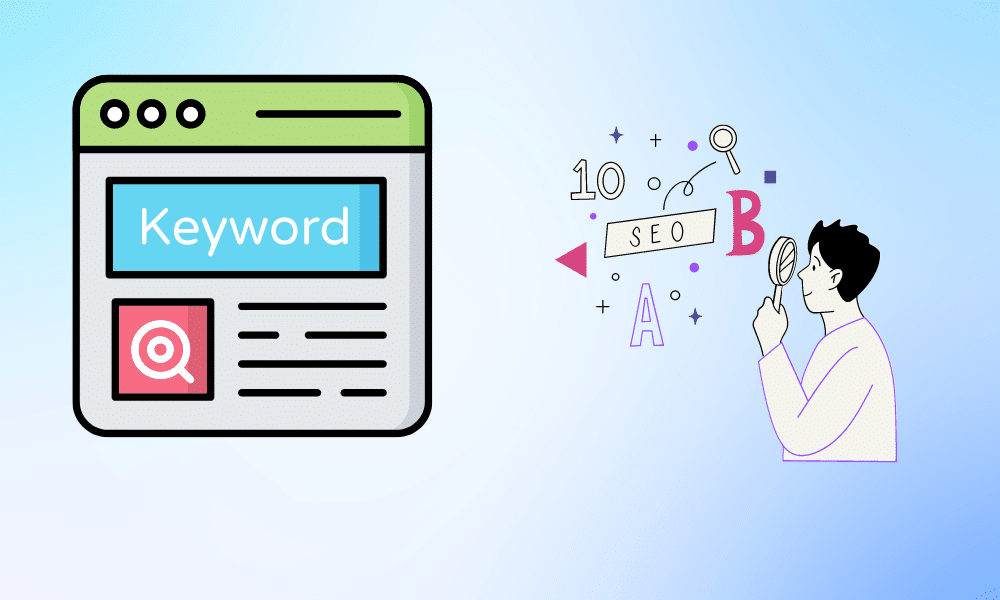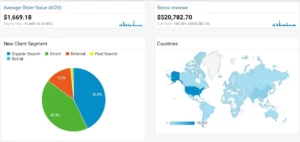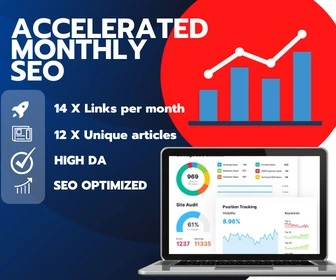In today’s competitive market, accountants who have an effective on-site SEO strategy agree that it is essential any accountancy businesses to attract more clients and improve their online presence. This guide will provide you with valuable insights on optimizing your website’s content to rank higher in search engine results, specifically targeting the US audience. Some of the official accountancy bodies and regulators in the US include the American Institute of Certified Public Accountants (AICPA) and the Financial Accounting Standards Board (FASB).
Note: Also look at our accountant marketing plan for a broader integrated marketing plan.
-
Keyword Research and Analysis
To begin, you must conduct thorough keyword research to identify relevant terms and phrases that potential clients are using to search for accountancy services. This will help you create targeted content that appeals to your audience and increases your chances of ranking higher on search engine results pages (SERPs).
Keyword Suggestions:
Below I will use some of the most popular keywords for the accounting industry and provide sample titles you can use in your blog posts. Notice that the ones with a low “difficulty” level are likely to perform better quicker, as there is less competition for these keywords.

1.1 Accountant (62 difficulty, 91000 volume) Title: “Expert Accountants: Committed to Your Financial Success” Contextual Relevance: Highlight the expertise of your accountants and how they can contribute to the client’s financial success.
1.2 The Accountant (55 difficulty, 63000 volume) Title: “The Accountant’s Role in Safeguarding Your Financial Health” Contextual Relevance: Explain the responsibilities of an accountant and their role in ensuring the financial well-being of businesses and individuals.
1.3 Accountant Near Me (22 difficulty, 31000 volume) Title: “Find a Trusted Accountant Near You: Comprehensive Local Accounting Services” Contextual Relevance: Focus on the convenience and benefits of using a local accountant and emphasize your firm’s comprehensive services.
1.4 Accountant Salary (57 difficulty, 25000 volume) Title: “Understanding Accountant Salaries: Factors That Influence Compensation” Contextual Relevance: Provide an overview of the factors that impact accountant salaries, such as education, experience, and location.
1.5 Tax Accountant Near Me (33 difficulty, 22000 volume) Title: “Local Tax Accountants: Expertise to Maximize Your Tax Savings” Contextual Relevance: Emphasize the benefits of using a local tax accountant and how they can help clients save money on their taxes.
1.6 Certified Public Accountant (57 difficulty, 14000 volume) Title: “The Value of a Certified Public Accountant: Ensuring Financial Integrity” Contextual Relevance: Discuss the importance of choosing a CPA and the rigorous process of obtaining the certification.
1.7 Tax Accountant (35 difficulty, 13000 volume) Title: “Why a Tax Accountant is Essential for Your Business and Personal Finances” Contextual Relevance: Explain the benefits of hiring a tax accountant for both businesses and individuals.
1.8 QuickBooks Online Accountant (68 difficulty, 12000 volume) Title: “Maximizing Efficiency with QuickBooks Online Accountant: Streamlining Your Financial Management” Contextual Relevance: Showcase how QuickBooks Online Accountant can improve the efficiency of managing finances for businesses and clients.
1.9 QuickBooks Accountant Online (67 difficulty, 8800 volume) Title: “Why Choose QuickBooks Accountant Online: A Comprehensive Solution for Accountancy Firms” Contextual Relevance: Highlight the features and benefits of QuickBooks Accountant Online for accountancy firms.
1.10 QuickBooks Accountant (70 difficulty, 7800 volume) Title: “Optimizing Your Accounting Practice with QuickBooks Accountant: Tools and Features for Success” Contextual Relevance: Explain how QuickBooks Accountant can help streamline accounting practices and improve overall productivity.
-
On-Page Optimization

To rank higher in SERPs, you must optimize your website content using various on-page SEO techniques. This includes:
2.1 Title Tags Ensure that each page on your website has a unique and descriptive title tag that accurately reflects the content. This will help search engines understand the purpose of the page and improve your chances of ranking higher for relevant keywords.
2.2 Meta Descriptions Craft compelling and informative meta descriptions for each page, as these provide a brief summary of the content and can influence click-through rates from SERPs.
2.3 Header Tags Use header tags (H1, H2, H3, etc.) to structure your content and make it easier for both search engines and users to navigate. Ensure that these header tags contain relevant keywords to further optimize your content.
2.4 Internal Linking Create a strong internal linking structure within your website to help search engines crawl and index your content more effectively. This also encourages users to explore your website further, potentially increasing engagement and conversion rates.
2.5 Image Optimization Optimize images on your website by using descriptive file names, alt tags, and compressing them to reduce page load times. This will improve the user experience and make it easier for search engines to understand the context of the images.
2.6 Mobile Optimization Ensure that your website is mobile-friendly, as an increasing number of users are accessing websites on their smartphones and tablets. Mobile optimization will provide a better user experience and can help improve your search rankings.
2.7 Page Load Speed Improve your website’s page load speed, as this is a critical factor that affects both user experience and search engine rankings. Use tools like Google PageSpeed Insights to identify areas for improvement.
2.8 Content Quality and Relevance Create high-quality, informative, and engaging content that addresses the needs and pain points of your target audience. This will help establish your accountancy firm as an authority in the industry and improve your search engine rankings.
-
Off-Page Optimization
In addition to on-site SEO, accountancy businesses should also focus on off-page optimization techniques. These include:
3.1 Building High-Quality Backlinks Obtain backlinks from reputable websites in the accountancy industry, as this can improve your website’s credibility and search engine rankings.
3.2 Social Media Marketing Leverage social media platforms to promote your content and engage with your target audience. This can help increase brand awareness and drive more traffic to your website.
3.3 Local SEO Optimize your website and online presence for local search by creating and maintaining a Google My Business listing, encouraging client reviews, and ensuring consistent NAP (name, address, and phone number) information across online directories.
4. Search Intent – Capturing the right accounting leads with SEO
Targeting a variety of search intent from different users when writing on-site content requires understanding the different types of search intent and crafting content to address each of them. For an accountant doing on-site SEO, this involves creating content that caters to informational, navigational, transactional, and commercial investigation intent. Here’s how to address each search intent:
- Informational Intent:
Users with informational intent are looking for answers or information related to a specific topic. To cater to this intent, create content that educates users on accountancy-related topics. This can include blog posts, articles, infographics, or video tutorials that cover topics such as:
- Tax law changes and updates
- Accounting best practices for small businesses
- How to choose the right accountant or accounting software
- Financial planning tips for individuals and businesses
- Navigational Intent:
Navigational intent occurs when users search for a specific website or page. To address this intent, ensure your website is easy to navigate, and optimize your content for branded keywords. This includes:
- Having a clear and concise website structure with a well-organized menu
- Using descriptive and keyword-optimized page titles and URLs
- Implementing proper schema markup to help search engines understand your site’s structure
- Ensuring your site is mobile-friendly and loads quickly on all devices
- Transactional Intent:
Users with transactional intent are looking to make a purchase or take a specific action. For an accountant, this could mean hiring an accountant or signing up for a consultation. To cater to transactional intent:
- Create clear and compelling calls-to-action (CTAs) throughout your website, such as “Schedule a Free Consultation” or “Hire an Accountant Now”
- Showcase client testimonials and success stories to build trust and credibility
- Offer easy-to-find contact information, including phone numbers, email addresses, and contact forms
- Highlight any special offers or promotions to encourage users to take action
- Commercial Investigation Intent:
Commercial investigation intent refers to users who are researching and comparing products or services before making a decision. To address this intent, create content that showcases your expertise and the benefits of choosing your accounting services. This can include:
- Detailed service pages that outline the specific accounting services you offer and their benefits
- Comparison guides that highlight the advantages of your services over competitors
- Case studies that demonstrate the positive impact of your services on client businesses
- FAQs that address common concerns and questions potential clients may have
By addressing each type of search intent in your on-site content, you’ll be better equipped to attract a wider range of users and satisfy their needs. This will ultimately result in improved search engine rankings, increased traffic, and more conversions for your accountancy business.
Conclusion
By following this on-site SEO guide, accountancy businesses can improve their online presence, attract more clients, and stay ahead of the competition. Remember to regularly monitor your website’s performance and make necessary adjustments to stay up-to-date with the latest SEO best practices.









